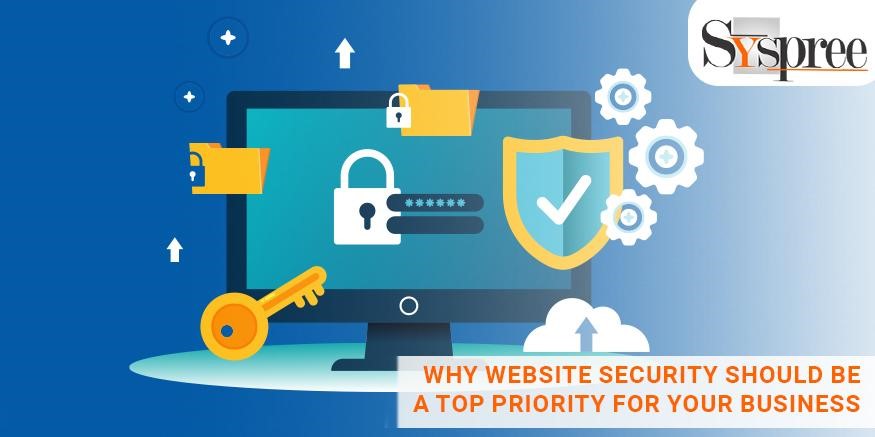In the current digital age, websites have become an integral aspect of every company. They function as the brand’s face, a means of customer interaction, and a way to market your products and services. The top web development company states that it is important to recognize many threats lurking in the dark in the sea of opportunities the web offers.
This is where Website Security is crucial. Therefore, whether you’re a small-scale startup or a major enterprise, understanding the importance of securing your website is vital to your company’s long-term success and longevity. Let’s look in and learn why you must make Website Security a top priority in today’s digital age.
Key Takeaways:
- Website Security is a top priority. In today’s digital age, it is vital to safeguard sensitive information, defend against cyberattacks, ensure business continuity, and maintain trust among customers and credibility.
- Website Security involves using various techniques, tools and protocols, for example, regular updates, secure hosting, strong password security, encryption, access control, users’ education, and security audits.
- Common security threats for websites comprise viruses, malware, and phishing attacks. DDoS attacks data breaches, as well as websites being hacked.
- As mentioned earlier, security measures to protect against the risks are regular upgrades, web-based application firewalls and malware scanners, users’ awareness, secure communications, SSL certificates, multi-factor authentication for security, monitoring traffic, Content delivery networks rate limitation and DDoS security services.
- Website Security is a top priority. It offers advantages such as the security of sensitive information and the prevention of cyber-attacks as well as maintaining business continuity, increased trust and loyalty of customers and competitive advantages in the marketplace.
Understanding Website Security
Website security refers to the procedures and procedures that are put in place to guard the website against possible security threats, vulnerabilities, and unauthorised access. It is implementing different methods, tools, and protocols to safeguard the confidentiality, integrity, security, and accessibility of a website’s information and features.
Website security covers many practices, including encryption and secure coding, frequent updates, access control, and monitoring tools. Allow a leading digital marketing company to guide you about website security thoroughly.
Why Should Website Security Be a Priority?

Why Should Website Security Be a Priority
Website Security should be the top priority for companies of any size, regardless of their field. The brilliant digital agency in Mumbai shares some of the reasons the importance of ensuring security for websites is vital:
-
Protection from Cyber Attacks:
Websites are frequently targeted by cybercriminals and hackers seeking to exploit weaknesses and gain access to sensitive data. By prioritizing the security of websites, companies can effectively guard against cyber attacks and lower the chance of loss of data or financial loss, as well as reputational harm.
-
Security of Customer Information:
Many websites store and collect customer data, such as names and email addresses, passwords, and payment information. Security breaches can cause the theft of valuable information, exposing users to the threat of being victimized by identity theft, fraud, and other cybercrime. Security of websites is a top priority to ensure that information about customers is properly secured, which helps to build customer confidence and trust.
-
Reducing the time a website is down:
The compromised website can be down for some time, making it inaccessible to users. This can cause significant harm, such as losses in revenue, a poor user experience, and harm to the brand’s reputation. Through strong security measures, companies can lower the risk of a website being shut down by attacks on hacking malware, hacking attempts, or other security breaches.
-
Protect yourself from Malware and viruses:
Malicious software, like viruses, worms and ransomware, can infect websites and cause damage to their functionality and integrity. These viruses can cause damage to files, take information, or exploit weaknesses to gain access without authorization.
The security of websites should be a top priority. This means implementing security tools, such as antivirus software, and regular security audits to safeguard against viruses and malware.
Common Website Security Threats
Malware and Viruses
The spread of viruses and malware is among the top security threats to websites. The malicious software can be able to infect websites in a variety of ways, including vulnerable plugins, themes that are compromised or user-uploaded files. Once installed, malware can cause serious damage, such as data theft, unauthorised access to the site, and even disruption of web-based functionality.
Protection against viruses and malware requires implementing strong security measures:
- Ensure the software for your website, including CMS platforms themes, plugins, and themes, is current and up-to-date. Developers regularly issue updates to fix security issues and fix any vulnerabilities.
- Web Application Firewalls (WAF) Help detect and filter out unwanted traffic, thereby preventing the possibility of malware infections.
- Frequently test your website for malware using software or plug-ins that detect and delete infected files.
- Select a reliable hosting service with robust protection measures and regular backups to reduce the threat of malware-related attacks.
- Instruct users and administrators of websites on safe internet browsing, including avoiding downloading suspicious files or clicking on links that are not trusted.
Phishing Attacks

Phishing Attacks
Phishing attacks attempt to deceive users of websites into divulging sensitive information, like passwords for logins or financial details, by impersonating legitimate entities. The attackers often employ deceitful messages, emails, and websites appearing legitimate to trick users into divulging sensitive information. Let the best digital marketing company in Singapore guide you about Phishing attacks.
To safeguard against attacks of phishing:
- User Education: Inform users of websites about the dangers of phishing and encourage visitors to be careful whenever they click on the links or submit personal details.
- Secure Communication: Implement security measures for email, including SPF, DKIM, and DMARC, to validate the legitimacy of email messages and decrease the possibility of phishing attempts.
- SSL Certificates: Use SSL certificates to encrypt communications between users and the site to ensure secure data transmission.
- Multi-Factor Authentication (MFA): Implement MFA to provide an additional layer of security. MFA requires users to present additional proof of identity prior to accessing sensitive information.
DDoS Attacks
Distributed DDoS (DDoS) attacks are designed to overwhelm a website’s server and make it inaccessible to users by inundating it with a massive volume of traffic. The attackers often employ botnets, which are systems of devices compromised to coordinate these attacks.
The most important considerations to mitigate DDoS attacks:
- Set up monitoring systems to identify abnormal traffic patterns and possible DDoS attacks.
- Use the Content Delivery Network (CDN) to distribute content from websites over multiple servers, effectively taking on and distributing traffic during an attack.
- Implement rate-limiting measures to limit the number of requests a single IP address can make within a certain period.
- Think about using DDoS security services which offer special mitigation methods and a system to deal with massive-scale attacks.
Data Breaches
Data breaches happen when unauthorised individuals gain access to confidential information on websites like customer information, payment details, or intellectual property. Data breaches can result in legal liability, financial losses and harm to a company’s reputation. The most efficient web development company shares strategies to stop data security breaches.
The most effective strategies to stop data security breaches:
-
Secure Authenticity:
Create solid password policies, urge users to use specific and complicated passwords and look into implementing 2-factor authentication (2FA) for increased security.
-
Data encryption:
Secure the data stored on websites and ensure that the data transmission is encrypted with secure protocols, like HTTPS.
-
Access Controls:
Use role-based access control (RBAC) to limit access to sensitive information and features, ensuring only authorized users can access them.
-
Regular Auditing:
Conduct security audits to find possible vulnerabilities, deal with them, and maintain the Website Security.
Website Defacement
Website defacement is the term used to describe unauthorized modifications to the appearance of a website or its content by hackers. Defaced websites often display images, messages, or malicious software that can affect the site’s reputation or mislead visitors. The best digital marketing company shares preventive measures as follows.
The best digital marketing company shares preventive measures against the defacement of websites, including:
- Strong Passwords: Use secure unique passwords for website administrator accounts to reduce the possibility of unauthorized access.
- Security Updates: Make sure your website’s software and plugins are up-to-date to fix any vulnerabilities that hackers may exploit to hack into the site.
- Regular Backups: Create regular backups of your database’s databases and files on the website to ensure rapid restoration during a hacking incident.
Benefits of Prioritizing Website Security
1. Protection of Sensitive Data

Protection of Sensitive Data
The importance of ensuring Website Security protects sensitive information like customer information, payment details, and confidential business information. Through strong security measures, companies can secure data transmissions, securely store data, and restrict access to only authorized individuals. This drastically reduces the threat of data breaches, protecting the company and its customers from financial loss, legal liability, and reputational harm.
2. Prevention of Cyber Attacks
A leading digital agency in Mumbai believes that website security measures play an important role in stopping cyberattacks. When they prioritize security measures, companies can lower the risk of malware infection, phishing attempts, DDoS attacks, and other harmful actions.
Secure firewalls, intrusion detection systems, and routine security audits help detect and avoid possible vulnerabilities while ensuring that your website is protected against ever-changing cyber-attacks.
This proactive approach reduces the chance of a website being down, as well as unauthorized access and compromise of data, thereby safeguarding the company’s reputation and online presence.
3. Maintenance of Business Continuity
A secure website can ensure the smooth running of business operations. If security measures are not adequate, websites are vulnerable to downtime or interruptions and unauthorized access. These incidents can cause a loss of revenue, a decrease in productivity, and even damaged customer relations.
Website Security is a priority to ensure an uninterrupted connection to the site and allows businesses to serve customers better, complete transactions and efficiently communicate. By ensuring accessibility and Website Security, companies can reduce the impact of security-related incidents and ensure a smooth operation.
4. Enhanced Customer Trust and Loyalty

Enhanced Customer Trust and Loyalty
Website Security directly affects customer loyalty and faith. In a time when cyber-attacks are frequent, customers are more concerned about the security of their data when dealing with businesses online.
By focusing on Website Security, businesses can be regarded as trustworthy companies that place a high value on data security from customers. That, in the process, increases customer trust and loyalty since they are confident that their data is secure in their hands. This trust boosts satisfaction with customers and repeats business, as well as positive word-of-mouth recommendations and competitive advantages in the marketplace.
Essential Best Practices for Website Security
Regarding website security, following the best practices is crucial to secure your online presence and reduce any potential threats. Here are the most important guidelines to take into consideration. First, make sure that all software, including CMS, plugins, and themes. (CMS) as well as plugins and themes up to date to fix any weaknesses.
The best digital marketing company in Singapore recommends always backing up your website’s data and databases to ensure speedy recovery in an emergency. Use strong password guidelines and encourage users to select specific and complex passwords. Use secure hosting providers with robust security measures and offer regularly scheduled backups.
Check your website regularly for malware with software or plug-ins for security. Secure data transmissions with protocols like HTTPS and keep information encrypted. Implement access control and role-based authorizations to block the access of unauthorized users to sensitive information and functions.
Instruct administrators and users of the website on safe browsing practices and the most common security threats. Perform regular audits of security to find and address security vulnerabilities proactively. Following these guidelines and procedures can increase your website’s security measures and protect your customers and business from any potential threats.
Conclusion:
In today’s world of the digital web, security is not merely an option but a must. Ensuring your website’s security will protect your company from cyber-attacks and reputational harm. It helps build trust with customers and helps ensure uninterrupted operations, which makes it an important part of your business’s strategy. If you find this article interesting, please take a look at the previous blog on 8 Web Design Secrets for E-commerce Success: Boost Your Online Store to New Heights.







